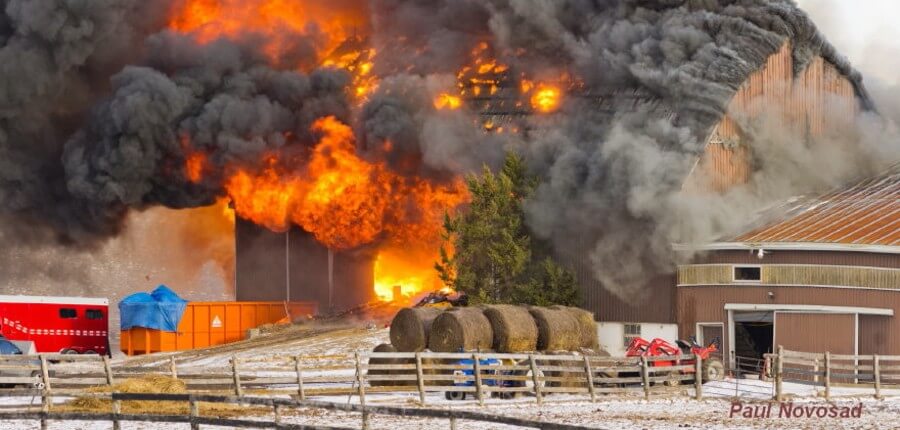I am a director of the Canadian Coalition for Farm Animals located in Toronto. Our mission is to promote the welfare of animals raised for food in Canada through public education, legislative change, and consumer choice.
In late 2015, we became aware that many farmed animals were dying in barn fires. These fires are rarely reported except in local news and sometimes only online. However, if humans, companion animals, or horses are killed, there is typically wide coverage. For example, in January 2016, 42 horses used for racing died in a fire in Ontario. That fire was reported widely in local, national, and even international news. The very same week, 50,000 ducks died in a fire in Québec, and there was only a brief online report.
We started doing online searches in English and French for barn fires. The results were devastating—there seemed to be a fire almost every day, sometimes involving the horrific deaths of thousands of pigs, chickens, ducks, or turkeys.
Fighting barn fires is complicated. They aren’t in cities with a municipal water source. Sprinklers aren’t a practical solution, because there isn’t enough water pressure or volume and pipes can freeze. Spraying cold water on some animals, especially babies, might kill them.
What often seems to happen is that someone notices the barn is on fire, usually at night. It could be the owner, a neighbor, or a passerby. They call the fire department, which may be half an hour away and staffed by volunteers who must go to the station, put on their gear, and then travel to the site of the fire with tankers of water. Usually, by that time, it’s too late.
We’ve tackled the problem in several ways. First, we researched the causes of fires and developed a website, PreventingBarnFires.com, with practical, cost-effective advice on ways to avoid a fire. We engaged provincial and territorial agriculture ministries, insurance companies, rural fire chiefs, fire alarm companies, and farmers. We sent out brochures to rural fire departments, put ads in farming magazines, did radio interviews, and submitted building code changes to Canada’s National Research Council.
The number of fires gradually decreased. There was a 35% decrease between 2018 and 2019. In the spring of 2020, there was an unprecedented stretch—March 27 to June 1—with no reports of animals dying in fires anywhere in Canada. Finally, on June 2, there was a fire in Ontario—four calves died, but 102 other animals were saved. Not only are there fewer fires now, more animals are also being rescued!
If you have animals in a barn (or your family does), do you have a fire-prevention plan in place to help protect them?
Vicki Fecteau and her husband, Gilles, are longtime PETA Vanguard Society and Augustus Club members. They live in Toronto, Ontario, where they’re avid volunteers and always involved in projects advocating for animals.





